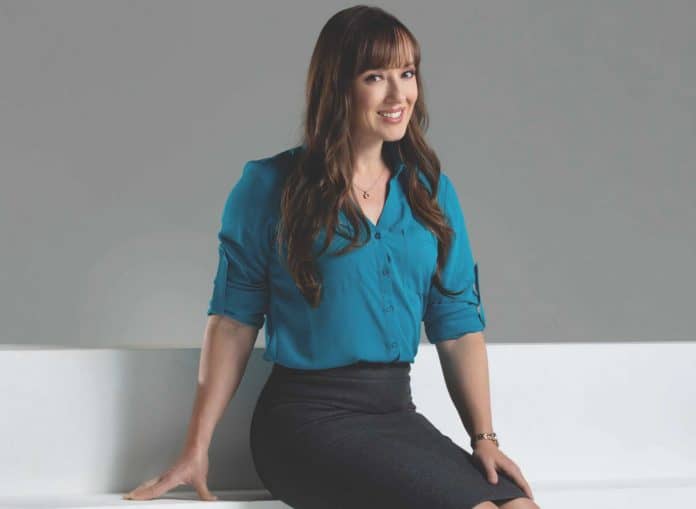Jessica Billingsley has charted an impressive career trajectory over the past ten years. First, as co-founder and chief executive officer, she steered cannabis compliance software platform MJ Freeway to prominence in twenty-nine states and fourteen countries. The company has processed more than $15 billion in transactions. Then, in June 2019, MJ Freeway merged with MTech Acquisition Corp., a publicly traded company that gathered $50 million in a 2017 initial public offering. The merger formed a new entity, Akerna Corp., and headlines hailed Billingsley as a trailblazer: “MJ Freeway Becomes First Female-led Cannabis Technology Traded on NASDAQ.”
With Akerna, Billingsley and her colleagues are fast becoming a major player—the proverbial 800-pound gorilla—in the cannabis technology sector. The game plan is to acquire and partner with other innovative software developers in order to build the next generation of digital tools and services for the fastest growing retail market in the world.
‘Software is eating the world’
Even before Billingsley became an entrepreneur in the industry, she had experiences with cannabis that shaped her perspective about the plant as both a medicinal and social phenomenon.
“Many early participants in the industry, like myself, either had a personal medical connection or a social justice drive. Otherwise, it just wasn’t worth the risk,” she said. “In my case, I have a family member with a demyelinating illness.”
While Billingsley was studying communications and computer science—an odd combination, perhaps, but one that has served her well as a technology entrepreneur—at the University of Georgia, she believed software was the future and wanted to be a part of the evolution.
“I was a good student, but knew I was never going to be best of the best,” she recollected. “But what I could do was translate that [technical know-how]into applications and innovation and communicate how the technology works to other people.”

While MJ Freeway may not be as disruptive as Uber and Airbnb, the company helped take the cannabis industry from the underground to a buttoned-up retail supply chain over the past decade, helping state regulators manage compliance and giving retailers a real-time understanding of consumer trends in a fickle, fast-moving industry.
When Billingsley invested in one of Colorado’s first cannabis operators, she was asked to select a software program to help run the business. “But I couldn’t find anything to adapt, and that’s where MJ Freeway was born,” she said. “It evolved through medical and social activism into the three Ps: public safety, product safety (a transparent and accountable supply chain), and patient safety (accurate labeling).”
Developed as a cloud-based platform allowing both operators and regulators to manage and navigate the complex track-and-trace process, MJ Freeway had to be custom-built due to the highly regulated nature of the industry. Billingsley noted that in other regulated businesses—alcohol, tobacco, pharmaceuticals, and agriculture—software tracking systems are somewhat effective, but none have a comprehensive platform that ties all the pieces together.
“Alcohol and tobacco do the consumer-safety piece pretty well, and agriculture does a decent job of ensuring supply-chain safety up to distribution, but then it’s all gone,” she explained. “Cannabis needed a hybrid model and the ability to tie together the concept from these models and adapt it for a product that’s brought to market in a high-value, dry-flower form.”
Billingsley is excited about the prospect of building out Akerna’s platform and adding to the network of fifty integration partners MJ Freeway developed over the past decade. When Billingsley says, “we are a true modern microservice, API-enabled, [enterprise resource planning] platform for cannabis ecosystems,” the words roll off her tongue like someone who has spent more than her share of time burrowing down computer-coding rabbit holes over the years.
The cannabis industry resembles the technology industry in several ways and, unfortunately, one of those is the scarcity of women in leadership and C-suite positions. That is a pain point for Billingsley, and one that she has taken up as a cause.
“My perception is that cannabis is very similar to the tech industry, and I do believe there is a cultural component,” she said. “In technology, women hold a smaller percentage of U.S. tech jobs than they did twenty-five years ago, and that’s not going in the right direction. Another fact is within ten years, women who enter technology drop out at rate of 56 percent.”
Using the tags #OneWomanChallenge and #StopTheDrop, Billingsley encourages industry operators of all stripes to help women get ahead in industry one interaction at a time.
“Real change is the result of many, many small acts,” she said. “Ask any person to help one woman in some way, whether it’s an email or intro or mentoring sessions. It may seem like a drop in a bucket but it creates a swell of real change, and cannabis can absolutely participate in the challenge.”
While she built MJ Freeway, Billingsley was determined to recruit top tech talent. One of the creative ways she did so was offering a thirty-hour work week to women who sought work-life balance. “It’s been wonderful for us and a tool to help stop the drop,” she said. “Folks are able to continue at reduced pay and hours and still have benefits. Every employee who has taken advantage of that has converted to full-time.”
‘Canna will never let you be bored’
For a company that started as a side gig when Billingsley lived in Atlanta, MJ Freeway has grown impressively and now employs more than 100 people. In fiscal year 2018, the company generated $10.5 million in sales.
While her ascension in the industry probably had more to do with her technical skills, she is equally proud of her communication and people skills and early on determined to build a company people wanted to join and stick with for the long haul. From the beginning, she focused on creating a work environment where employees feel appreciated.
One of those employees is the “director of people,” who focuses on building corporate culture and maintaining strong communication channels between employees and leadership.
“We do focus a lot on employee retention and culture and have been very intentional from inception,” Billingsley explained. “We have adjusted our north star a few times, but our core values have never changed: Do the right thing, be part of the solution, and show people you care. That means both within the business and for our clients.”
Billingsley’s number one and two employees are still by her side. They helped her ring the bell to open NASDAQ trading on the day Akerna made its debut on the market.
“It helps that we are doing new stuff every year and serving a fast and explosive market where we have new challenges and problems innately for our team to sink their teeth into,” she said. “So, there are a number of factors and I’d like to take the credit, but some of it is the nature of our emerging industry. I’m a technologist myself, and the worst thing for me is to be bored. Canna will never let you be bored.”
As more states across the country legalize cannabis in one fashion or another, business professionals from other industries have been enticed by the siren call of opportunity.
“We had visionaries early on, so there have been very smart, forward-looking people from inception. But it’s wonderful to have continuous access to a pool of professional talent who are excited to work in a fast and growing industry,” Billingsley said. “That was a challenge early on, when we would only advertise that we were a technology company. Then, after the interview, we would share the whole story. About 50 percent of people would walk away. But now we have the opportunity to hire the best and brightest people who are excited to work in an expanding market.”

As Akerna looks forward into the increasingly competitive space of software and compliance solutions, one of the biggest assets the company has may be the massive amount of data it has collected in markets across the U.S. and abroad.
“We have an unprecedented amount of data for consumer packaged goods and the supply chain,” she said. “The number of data points we track, and then provide value and leverage and access, is pretty phenomenal.”
The primary benefit for clients is insight about consumer buying trends. Billingsley noted women between the ages of 50 and 60 are the fastest-growing group of cannabis consumers. The top five reasons people cite for using cannabis are health- and wellness-related: Sleep, anxiety, and pain are driving the majority of sales across the U.S.
Using this data to generate revenue is a key part of Akerna’s business strategy and mission. One need look no further than Facebook’s $500-billion market cap to understand how valuable consumer insights can be in today’s digital retail ecosphere.
“We have had the right since inception at MJ Freeway to aggregate and monetize our client data as long as its anonymized,” Billingsley explained. “There is a wealth of data insights to be mined, and our guarantee for our platforms and enterprise customers is to provide more value than cost and leverage data to provide insights back to the operators.”
Of course, anytime a company collects and manages terabytes of data on a daily basis, hackers and competitors take notice. Inherent risks and threats lurk in the extended network of servers and computers where data is transferred and stored. In 2016, MJ Freeway was the victim of a cyberattack that disrupted its business operations and created something of a public relations crisis for the company and its core product. The stolen data included customers’ contact information and dates of birth, but no other sensitive information, according to the company. After the dust settled, MJ Freeway was able to recover 90 percent of the compromised data.
“We were the victim of a vicious cyberattack on our legacy platform, which is a product that we have since retired,” Billingsley said. “It was a very significant learning experience, and we’ve come out stronger on the other side with a big investment in security. We now spend [on security] like a company many times our size.
“We’ve developed a culture of security in our company that I’m proud of moving into the post-cloud era,” she added. “We recovered well and have experienced double-digit growth twice over since that happened. It was a tough lesson, but I’m grateful to look at things through the lens we do now.”
Two sides of a coin
When she entered the industry, Billingsley understood the challenges and complexities of starting a company in a market dealing in a federally illegal product, even when the company doesn’t touch the plant. Still, she was caught off guard by the extent of the problems cannabis entities continue to face daily.
“I was somewhat naïve when we founded MJ Freeway and did not anticipate we would be subject to some of those challenges, but we faced our share of banking and merchant processing and insurance issues,” she said. “Our growth also was constrained by the rate of regulatory change, which presents its own set of challenges. We had to rein in during years where not a lot of new regulations were passed, and then expand rapidly when major sweeping regulatory changes across markets took place. So, opportunity and challenges are two sides of the same coin for us.”
Flash forward to 2019, and Billingsley’s Akerna finds itself in a unique position as one of the very few cannabis companies listed on a public stock exchange in the U.S., with a healthy influx of cash and new investors ready to fuel its growth.
“This merger gives us a larger platform to execute our vision, which is to drive organic growth and lead the cannabis tech consolidation that is essential for rapidly scaling industry sustainability,” she said (all in one breath). “So, having additional cash with this listing and lower cost of future capital does allow us to pursue that vision and strategy that is not as straightforward in a private company.”
Like every other cannabis company CEO in the U.S., Billingsley looks forward to federal legalization. For the first time in many years, she feels optimistic about that prospect.
“I have been doing this for ten years, and MJ freeway has processed over $15 billion in transactions, but I have not been saying federal legalization is coming in the next couple years,” she said. “Today, I do think we are likely to see either a states’ rights act or some real change via executive order in early 2020. So, if I get that right, maybe they’ll say ‘she called it!’”












